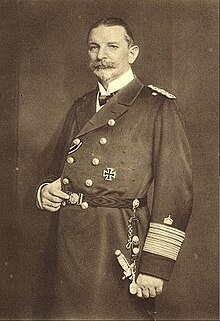Eduard von Capelle
| Eduard von Capelle | |
|---|---|
 |
|
| Born | 10 October 1855 Celle, Lower Saxony, Kingdom of Hanover |
| Died |
23 February 1931 (aged 75) Wiesbaden, Hesse, Germany |
| Allegiance |
|
| Service/branch |
|
| Years of service | 1872–1918 |
| Rank | Admiral |
Admiral Eduard von Capelle (10 October 1855 – 23 February 1931) was a German Imperial Navy officer from Celle. He served in the navy from 1872 until his retirement in October, 1918. During his career, Capelle served in the Reichsmarineamt (Imperial Navy Office), where he was primarily responsible for writing the Fleet Laws that funded the expansion of the High Seas Fleet. By the time he retired, Capelle had risen to the rank of admiral, and had served at the post of state secretary for the Reichsmarineamt. From this post, he oversaw the German naval war during the latter three years of World War I. Capelle retired to Wiesbaden, where he died on 23 February 1931.
Eduard Capelle was born on 10 October 1855, in Celle, in what was then the Kingdom of Hanover. His father, Eduard (1832–1897), was a factory owner, and his mother was Emilie Kraus (1831–1903); the younger Eduard had a brother, Hans (1864–1948), a physicist who served as President of the German Naval Observatory. Capelle joined the Imperial German Navy in 1872, as a naval cadet. He served in various capacities in the fleet, including in the Torpedowesen (Torpedo Department) with Alfred von Tirpitz. In December 1894, he was serving as the executive officer of the battleship SMS Weissenburg. He was later assigned to the Reichsmarineamt (RMA), the Imperial Navy Office, as the chief of the administrative department. In this capacity, he began to work closely with now-Admiral von Tirpitz, who had been promoted to become the State Secretary for the Navy. Capelle was responsible for drafting the legislation that became the Flottengesetz, the Fleet Laws, and the supplementary laws in 1906, 1908, and 1912. During this period, he and other senior members of the naval command worked repeatedly to break monopolies in the shipbuilding industry, as a means to keep costs low and stable. The only firm that proved resistant to their efforts was Krupp, which held a near monopoly on armor plating and large-caliber guns, and proved to be too powerful for the RMA to effectively pressure.
...
Wikipedia
